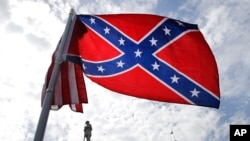An honor guard from the South Carolina Highway Patrol has taken down the Confederate flag that has flown on the grounds of the southern U.S. state Capitol for more than 50 years.
A bi-racial crowd of hundreds cheered and chanted "USA, USA" Friday as they witnessed the flag's historic removal from the Statehouse grounds - a day many in the state thought would never come.
Several waved the American flag - the Stars and Stripes.
The move comes three weeks after the racially inspired murders of nine African American church members in Charleston, South Carolina.
Outside the Capitol, people who supported taking down the flag vastly outnumbered those who were upset about its removal. An African American legislator told CNN he and other activists have been fighting and staging boycotts to remove the flag for more than 20 years.
Many atheletes and entertainers have refused to play in South Carolina because of the issue.
The flag's removal comes one day after Governor Nikki Haley signed a bill supported by Democrats and Republicans removing the Civil War-era flag. Lawmakers in South Carolina's House of Representatives followed the state Senate when they passed the bill after more than 13 hours of emotional debate.
President and CEO of the Columbia South Carolina Urban League J.T. McLawhorne told VOA that while some people have framed the flag as a heritage' symbol, it is really much more harmful.
"When you look at the history, the history is very clear that this flag is a symbol, an active symbol, of intimidation, racism, and terrorism that has been inflicted on African American people for years," McLawhorne said.
Haley Thursday called it "a great day" for South Carolina - one that "truly brings us all together as we continue to heal, as one people and one state." She handed each of the nine pens she used to sign the bill to the families of church shooting victims.
Haley said the flag will be put in its rightful place in a museum.
The president of the civil rights group National Association for the Advancement of Colored People, Cornell William Brooks, said removing the flag not only "denounces an odious emblem of a bygone era" but also honors the lives of the nine church members killed in the attack. He said "this decision will make South Carolina more welcoming and affirming of all people, irrespective of their skin color."
An intense statewide campaign to get rid of official public displays of the flag began after a white racist allegedly massacred the nine black members of the Emanuel African Methodist Episcopal Church in the city of Charleston June 17.
Pictures later surfaced of the accused gunman, Dylann Roof, holding the Confederate flag. Roof was also seen in pictures, wearing the colonial flags of South Africa under aparthed, and then Rhodesia, before it became Zimbabwe after independence in 1980.
That flag represented a handful of southern U.S. states that seceded from the nation in the 1860s in a failed push to keep slavery legal.
Flag opponents call it a symbol of white supremacy and slavery. Flag supporters say it is a sign of history and pride in their family heritage. Many of them abhor the racists who they say have hijacked the flag.
The Confederate flag flew on top of the South Carolina State House from 1962 until it was moved to a Civil War memorial in 2000. Flag opponents say it originally was put up over the Capitol to defy racial integration.






